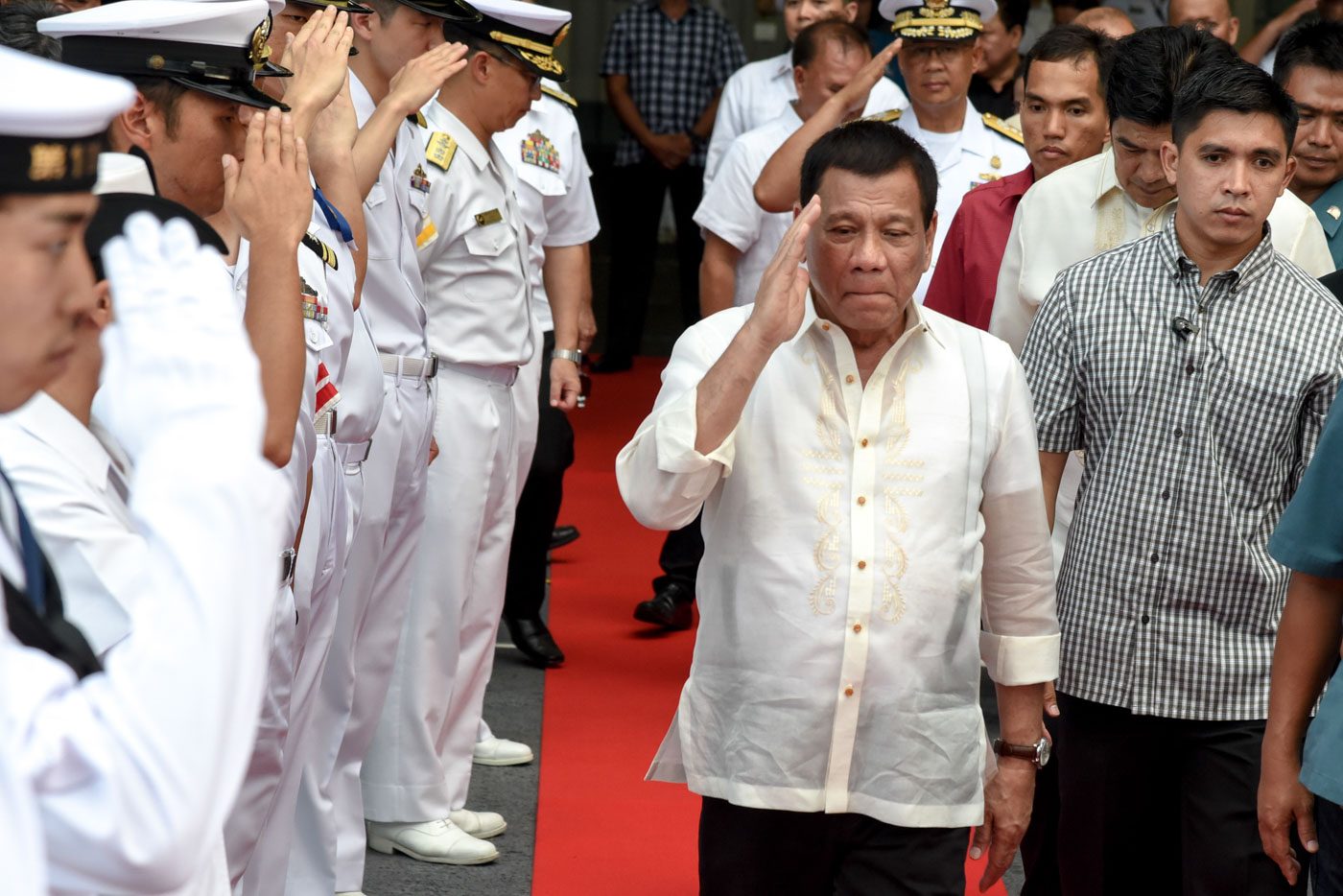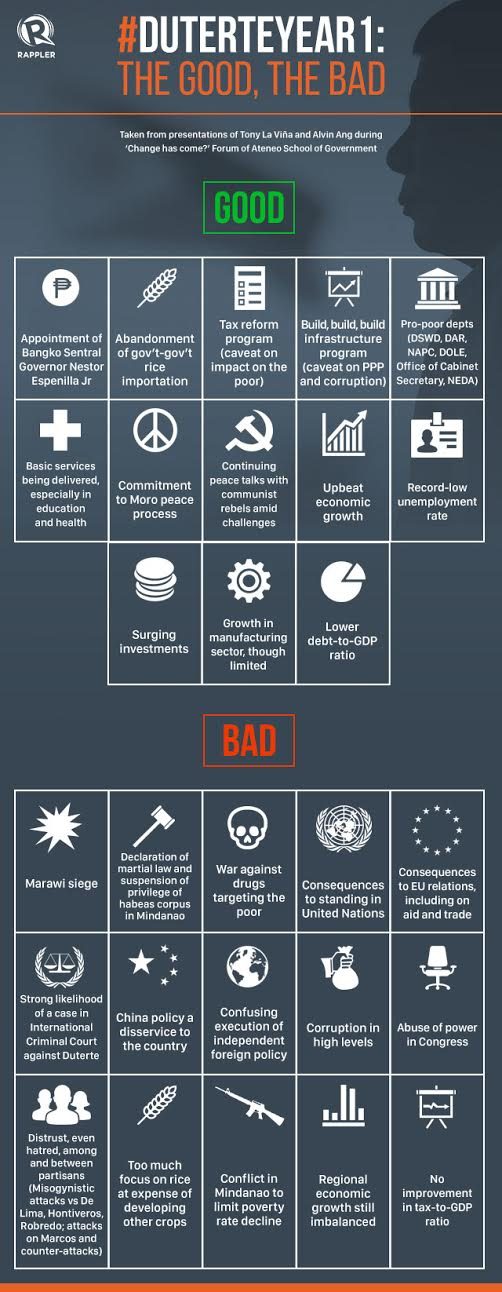SUMMARY
This is AI generated summarization, which may have errors. For context, always refer to the full article.

MANILA, Philippines – Three analysts eminent in their fields shared their assessment on the first year of President Rodrigo Duterte’s administration during a forum on Thursday, June 22.
The forum, entitled “Change has come?” was held at the Ateneo Professional Schools and was organized by the Ateneo School of Government (ASoG).
Tony La Viña, former dean of ASoG gave a rundown of what he thinks are the good and bad points scored by the administration.
Economist Alvin Ang, director of the Ateneo Center for Economic Research and Development, pointed out positive economic indicators as well as the challenges the Duterte government faces if it is to continue the upward economic trajectory achieved by the previous administration.
Social Weather Stations (SWS) president Mahar Mangahas spoke of Duterte’s “very good start” in survey ratings but said keeping up with the achievements of his predecessor, Benigno Aquino III, would be a “big challenge.”

The good
First on La Viña’s list of good points was Duterte’s appointment of Bangko Sentral Governor Espenilla whom the former dean described as the “perfect man for the job.” Mangahas also said Duterte made a “very, very good choice.”
Given the BSP governor’s critical role in the country’s economy, La Viña gladly noted how Duterte chose Espenilla despite not knowing him well and having no political connections to him.
Next on his list was the Duterte administration’s decision to abandon government-to-government (G2G) rice importation. This particular policy shift was the battle cry of Cabinet Secretary Leoncio Evasco Jr who heads the NFA Council.
Stopping G2G importation has long been a clarion call of economic experts but previous administrations were never able to implement it due to vested interests, said La Viña.
He praised Evasco as “a true advocate of the poor” and for doing “incredible work” in handling the 12 anti-poverty agencies Duterte put under his wing.
These two important decisions made in his first year indicates that “the president has good listening and decision-making skills, immense political will,” said La Viña.
However, it must be noted that before Duterte went along with the NFA Council’s abandonment of G2G importation, he had declared a policy of stopping all kinds of rice importation and fired Evasco’s undersecretary, Halmen Valdez, in the process.
This, despite his economic advisers and the NFA Council’s stand that rice importation is necessary since the country’s own rice production is insufficient to provide the required rice buffer stock.
Watch videos of all 3 presentations here:
Tony La Viña’s presentation
Alvin Ang’s presentation
Mahar Mangahas’ presentation
La Viña also pointed to several policies that show “inclusive development is the mantra” of this administration.
These include the “pro-poor departments” of the Department of Social Welfare and Development, Department of Agrarian Reform, National Anti-Poverty Commission, Department of Labor and Employment, Office of the Cabinet Secretary, and the National Economic Development Authority.
Five of these agencies are led by Leftist Cabinet members whose performance in the last year proves “the Left can govern,” said La Viña.
The continuing Bangsamoro peace process and peace talks with the Communist Party of the Philippines, albeit with some challenges, also shows “reforms can survive a change in administration,” thus counting as good points in La Viña’s book.
The political expert also gave Duterte a thumbs-up for two economic policies, though he had caveats to make for both: the proposed tax reform package and the Build, Build, Build infrastructure program.
La Viña said certain aspects of the tax reform package may impact the poor, especially given proposed additional taxes on sugary products, vehicles, and fuel.
The administration’s ambitious infrastructure program, meanwhile, is vulnerable to corruption given the large sums of money involved.
Economist Alvin Ang also had good things to say about the country’s economy under Duterte. While inflation has been picking up in the last few days, it has remained within the BSP’s upper limit of 4%.
Economic growth also remains “upbeat” at 2% higher than the generational average of 4%. If the administration is able to keep this up, “we might see a tremendous drop in poverty rate,” said Ang.
It was also during Duterte’s first year that unemployment reached a “decades low” of 5.7%. Ang noted that “surging” investments are likely to support future economic growth.
The bad
Topping La Viña’s list of bad aspects of Duterte’s first year is the Marawi siege. While he pointed out that the government is not entirely to blame for the siege, he cautioned Duterte against conflating terrorism and the drug problem and to recognize that “the real opium of terrorism is martyrdom’s rewards.”
The month-long siege has killed almost 100 civilians and government personnel and has displaced thousands of people.
La Viña also called out Duterte for declaring martial law and suspending the privilege of the writ of habeas corpus in Mindanao. He said martial law is only legally justified in Marawi City, ground zero of the clashes with terrorist groups since Duterte did not present any documentary evidence of ISIS threats in other parts of Mindanao. La Viña also criticized Congress for not convening to review Duterte’s martial law proclamation.
Third on the political analyst’s list is Duterte’s drug war and its focus on poor communities. While it’s good that Duterte recognizes the spread of illegal drugs as a problem, he has cited inaccurate figures to support his bloody campaign and encouraged killings.
“It is not right and just. Impunity will haunt us for decades,” said La Viña.
SWS President Mahar Mangahas said the drug war has hurt the credibility of the Philippine National Police, citing figures showing a majority of Filipinos (77%) have doubts on whether the police force is telling the truth about the drug killings.
The drug war has impacted the country’s standing in the United Nations and increased chances of a case against Duterte in the International Criminal Court, said La Viña.
The drug war and the Duterte administration’s support for the death penalty spells consequences in the country’s ties with the European Union, particularly on the aspect of aid and trade.
Mangahas also criticized Duterte’s tendency to bad-mouth foreign officials on the basis of his anti-Western sentiments.
“All that bad-mouthing is just going to make the bad-mouther look bad because he isn’t thinking. You can’t use your personal resentments for foreign policy,” said Mangahas.
Duterte’s China policy was another low point in his first year, said La Viña, calling his embrace of the Asian giant a “disservice to the country.” Duterte’s statements on allowing the sharing of resources in the West Philippine Sea, for instance, could have “long-term consequences on our legal position” on the maritime dispute.
As for Duterte’s supposed “independent foreign policy,” La Viña said its execution has so far been “confusing.”
Yet another negative aspect of Duterte’s first year is the sorry state of the country’s justice system, said La Viña.
He pointed to the politically-motived drug charges against Senator Leila de Lima, the downgrading of charges against cops involved in the Rolando Espinosa slay, and the uncertainty of the pork barrel cases.
Despite Duterte’s battle cry against corruption, there continue to be abuses by high-ranking officials, including two Bureau of Immigration deputy commissioners who were Duterte’s fraternity brothers.
La Viña had much to say about the “abusive” Congress under Duterte which has put a premium more on “numbers than quality of arguments.”
There was the sordid De Lima and Ronnie Dayan hearings in the House of Representatives and the rejection of Environment Secretary Gina Lopez by the Commission on Appointments due to the mining lobby.
La Viña also cited the impeachment cases against Robredo and Duterte, and the Lower House’s previously unheard of show cause order to 3 Court of Appeals justices who ordered the provisional release of detained Ilocos Norte officials during hearings on alleged misuse of Ilocos Norte tobacco funds.
From an economist’s point of view, Ang said the Marawi crisis and other conflicts in the country will deal a blow to the country’s efforts to reduce poverty, since many of the poorest provinces are now also conflict zones.
The Marawi clashes are also harming the tourism sector, given the current rate of cancellations.
Growth remains imbalanced among regions. For instance, the growth in the manufacturing sector has largely been confined to certain regions like Calabarzon.
Ang also said the administration’s focus on rice may mean stunted development of other crops like cassava. The country could be losing an opportunity since many regions are more suited to crops other than rice. The Autonomous Region in Muslim Mindanao, for instance, has become a top producer of cassava.
While investments are surging, the Philippines still has the lowest amount of foreign direct investments compared to its Southeast Asian neighbors.
All 3 analysts agreed that while the Duterte administration began on a high note, high expectations will keep the pressure on as government faces new and old challenges alike. – Rappler.com
Add a comment
How does this make you feel?
There are no comments yet. Add your comment to start the conversation.